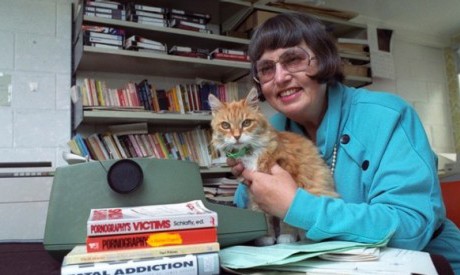How do you solve a problem like Patricia Bartlett?
The Lower Hutt morals campaigner was ejected from her nunnery in 1969 for her too-vocal convictions, and became a thorn in the side of politicians and film censors for 25 years.
Establishing the Society for the Promotion of Community Standards in 1970, the diminuitive Bartlett made her life’s work the opposition to pornography, homosexuality, abortion and sex education in schools.
In her time as the society’s director, Bartlett made 33 submissions to Parliament on moral issues, and in 1970 presented politicians with a 49,000-signature petition objecting to nudity and bare breasts in films and stage shows.
“She drove politicians, liberals and censors mad, drew supportive crowds by the hundreds and gave any hecklers as good as she got. She was no stranger to insults and sneers and innuendo,” The Dominion wrote in 1997.
“Small, neatly turned out and with an impeccable hair-do, Bartlett was invariably polite on arrival at tribunals and meetings,” The Evening Post noted on her death in 2000.
“Her knowledge of her subject was daunting, and her submissions were delivered emphatically. Her textbook use of rhetoric could render ministers of the Crown and officials apoplectic.”
At its peak in the 1970s, Bartlett’s society had 25,000 members, and she was a household name. In 1977 she given an OBE for services to the community. In 1980 she persuaded the Government to add a new clause to the Film Commission’s legislation requiring it to take account of public decency.
Bartlett was not afraid to attack her own. In 1982, during a Lent address at Wellington Cathedral, she gave Christians a tongue-lashing for the apathy she said had led to the spread of pornography, and the consequent degradation of women and marriage.
In 2014 the “puritan” was named one of the 10 least cool New Zealanders in history, but the Post gave a more rounded picture in its obituary.
“There’s a view common to her opponents that Bartlett was a sanctimonious biddy determined to stamp her personal brand of prudery on all and sundry. In fact, she was a bright, personable and funny individual with a level of courage few of her contemporaries could muster.”
Born in Napier in 1928, Bartlett trained as a teacher before entering the Sisters of Mercy convent aged 22. The move shocked her friends, because she had led a hectic social life as a teenager, going on dates sometimes four nights a week.
After 18 years she left the nunnery after a standoff about her letters to film censors and newspapers. Her move to public activism was provoked by adult magazines she spotted in a Newtown dairy in 1969, and the staging of sex revue Oh, Calcutta! in 1970.
“I just felt the church wasn’t tackling the moral problems which I saw happening,” she said.
Heart problems led to her retirement as society director in 1995, and she devoted her remaining years to travel, opera, and tracing her family tree.
Source and Image:
Additional readingNews category: Features.




